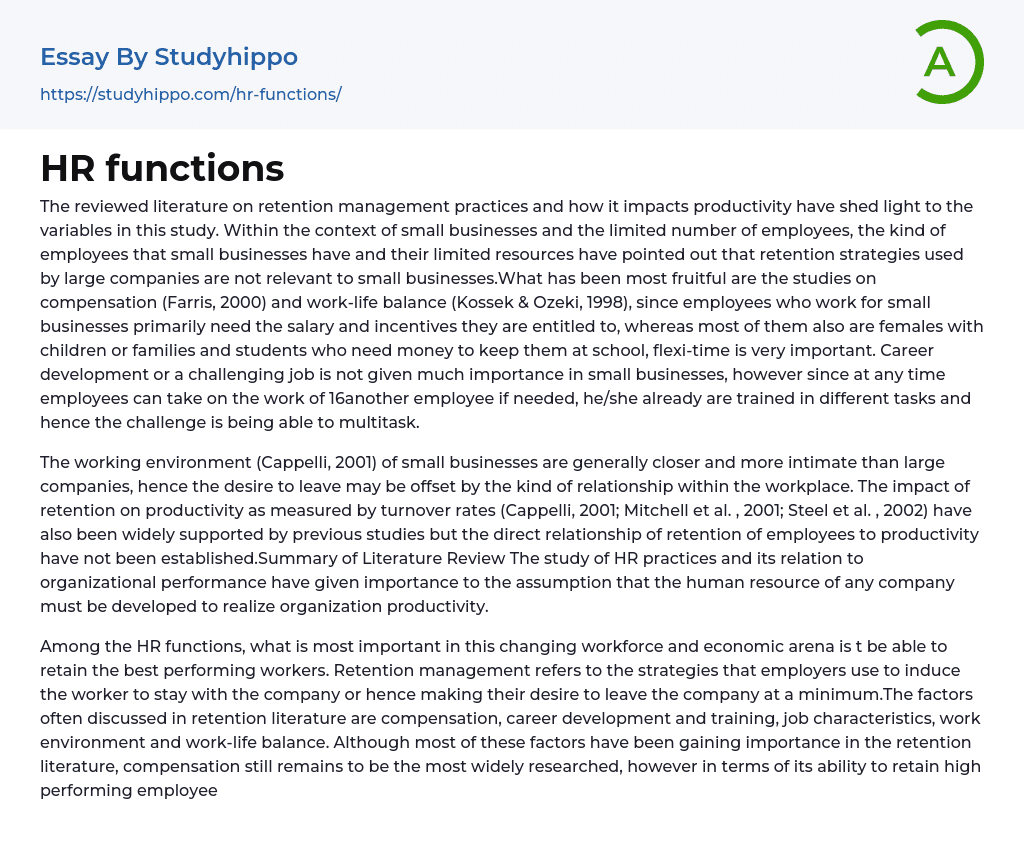The reviewed literature on retention management practices and how it impacts productivity have shed light to the variables in this study. Within the context of small businesses and the limited number of employees, the kind of employees that small businesses have and their limited resources have pointed out that retention strategies used by large companies are not relevant to small businesses.What has been most fruitful are the studies on compensation (Farris, 2000) and work-life balance (Kossek & Ozeki, 1998), since employees who work for small businesses primarily need the salary and incentives they are entitled to, whereas most of them also are females with children or families and students who need money to keep them at school, flexi-time is very important. Career development or a challenging job is not given much importance in small businesses, however
...since at any time employees can take on the work of 16another employee if needed, he/she already are trained in different tasks and hence the challenge is being able to multitask.
The working environment (Cappelli, 2001) of small businesses are generally closer and more intimate than large companies, hence the desire to leave may be offset by the kind of relationship within the workplace. The impact of retention on productivity as measured by turnover rates (Cappelli, 2001; Mitchell et al. , 2001; Steel et al. , 2002) have also been widely supported by previous studies but the direct relationship of retention of employees to productivity have not been established.Summary of Literature Review The study of HR practices and its relation to organizational performance have given importance to the assumption that the human resource of any company must be develope
to realize organization productivity.
Among the HR functions, what is most important in this changing workforce and economic arena is t be able to retain the best performing workers. Retention management refers to the strategies that employers use to induce the worker to stay with the company or hence making their desire to leave the company at a minimum.The factors often discussed in retention literature are compensation, career development and training, job characteristics, work environment and work-life balance. Although most of these factors have been gaining importance in the retention literature, compensation still remains to be the most widely researched, however in terms of its ability to retain high performing employees; even very high salaries have not been found to significantly influence turnover (Higginbotham, 1997), while profit sharing and permanent salary increases seem to reduce turnover (Kochanski & Ledford, 2001; Balkin & Gomez-Mejia, 1984).Most of the studies are also quantitative in nature 17 and employed the use of survey questionnaires or interview schedules.
Productivity was also measured in terms of turnover rates and only a handful identified financial performance as influenced by HR functions. The data gathered in this study also heavily leaned towards numerical statistical analysis ranging from descriptive statistics to inferential statistics.The most relevant input that the review of literature elucidated was how the different retention strategies are not all applicable to small businesses and that productivity as direct business outputs have not been studied extensively. Based on these observations, the present study would investigate the kind of employee retention measures of small businesses as it impacts direct business productivity.
- Auction essays
- Balanced Scorecard essays
- Business Plans essays
- Expense essays
- Income essays
- Net Income essays
- Security Guard essays
- Singapore Airlines essays
- Battle essays
- Intranet essays
- Maintenance essays
- Simulation essays
- Inn essays
- Qualities essays
- Leadership and Management essays
- Change Management essays
- Project Management essays
- Knowledge Management essays
- Operations Management essays
- Quality Management essays
- Risk Management essays
- Scientific Management essays
- supply chain management essays
- Performance Management essays
- Time Management essays
- Brand Management essays
- Total Quality Management essays
- Risk essays
- Manager essays
- Leadership essays
- Business Ethics essays
- Board Of Directors essays
- Product Management essays
- Comparative Analysis essays
- Decision Making essays
- Dispute Resolution essays
- Stress Management essays
- Business Management essays
- Brand Equity essays
- Branding essays
- Nike, Inc. essays
- Market share essays
- Razor essays
- Being A Leader essays
- Servant Leadership essays
- Leadership Experience essays
- Leadership Qualities essays
- Incentive essays
- Culture essays
- Social Control essays




